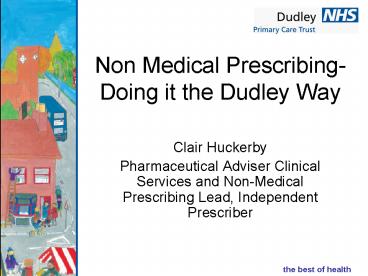Non Medical Prescribing Doing it the Dudley Way - PowerPoint PPT Presentation
1 / 19
Title:
Non Medical Prescribing Doing it the Dudley Way
Description:
... review of relevant policies, best practice in record keeping, up-to-date competency framework ... of factors affecting GPs prescribing decisions during ... – PowerPoint PPT presentation
Number of Views:57
Avg rating:3.0/5.0
Title: Non Medical Prescribing Doing it the Dudley Way
1
Non Medical Prescribing- Doing it the Dudley Way
- Clair Huckerby
- Pharmaceutical Adviser Clinical Services and
Non-Medical Prescribing Lead, Independent
Prescriber
2
Aims
- Evolution of Non Medical prescribing in Dudley
- How the Pharmacists have put this into practice
- The future
3
The Evolution of Non Medical Prescribing in Dudley
- Nurse Prescribing
- Pharmacist Prescribing
- Non Medical Prescribing Steering Group
- Non Medical Prescribing Lead
- Service Development
- Training and Education
4
Why is Non-Medical prescribing considered a good
idea ?
- To improve health services and patient care
- by improving patient access to medicines
- making better use of skills of all healthcare
professionals - more efficient use of resources
- We have come along way
5
Expansion of non medical prescribers
- Expansion within nursing profession
- Government Strategy Pharmacy in the future
implementing the NHS plan - 2000 - patients needs will be better met by some
pharmacists being allowed to prescribe medicines
for them directly - Changes to primary legislation to allow
pharmacists to become prescribers
6
Pharmacists as Prescribers
- First stage was development of Supplementary
Prescribers (SP)- first cohort of PBPs from
Dudley qualified in 2004 - Stepping stone to Independent Prescribing
- Independent Prescribers qualified 2006/07 (Dec
2008- 17 PIPs) - Still need both SP and IP
7
Non Medical Prescribing Steering Group
- To advise, promote and oversee non medical
prescribing within the PCT. - Providing an operating framework which will
inform and advise on Clinical Governance in order
to support the development of high quality care
and patient safety in NMP. - Responsibilities- implementing NMP to enhance the
quality of patient experience
8
We knew it would be a challenge!
- Quality Assurance- Clinical Governance Framework,
NMP Database, Prescribing visits, audit, ePACT
analysis, peer review - Training- commissioning of places, ongoing
maintenance of competence - Evaluation- local and national
- Medicines Management Policy
- Strategy for Non Medical Prescribing
- Resource folder for Non Medical Prescribers
9
Quality Assurance
- We will work continuously to improve services
- We will value, support and develop all our staff
10
Risk Matrix
11
Practice Based Pharmacist Service
- The purpose is to promote clinical and cost
effective prescribing and to ensure the rational
use of medicines within the Trust - The Practice Based Pharmacist (PBP) will provide
the following services - Level One
- General Medicines Management service- acting as
an advisory resource to the PCT and the Practice
in relation to medicines management, repeat
prescribing - Specialist Medication Review Service- in line
with Standards of Best Practice for Medication
Review, the PBP will use specialist knowledge to
support the practice and PCT in the review of
medication - Level Two
- Specialist Clinical Service- PBPs will be
involved in the development of the Specialist
Clinical Pharmacist role. This may involve
providing clinical services in agreement with the
PCT and the practice, in line with PCT Policy,
guidelines and protocols e.g. Independent
Prescribing as part of a Pharmacist-led
hypertension clinic.
12
Putting it into context.
- Hypertension clinic
- Respiratory Medicines Management Clinic
- Medication Review clinic
13
Major benefits we have identified by training
Prescribing Pharmacists
- To our organisation
- Management / reduction of prescribing costs
- Provide role model to other prescribers by
demonstrating good practice - Better understanding of factors affecting GPs
prescribing decisions during patient
consultations - Vastly improved multi-disciplinary working
- Retention of motivated staff
14
Benefits to the Pharmacist Independent Prescriber
- Increased job satisfaction
- Enjoy patient contact
- Keen to set up their own clinics
- Increased confidence and self esteem
- At leading edge of pharmacy practice
- Eager to extend their range of knowledge and
competencies in other clinical areas. Our team
now covers hypertension, CVD, COPD, asthma,
arthritis, musculo-skeletal disorders, obesity,
smoking cessation and womens health
15
Benefits to Patient
- Multidisciplinary team
- Appropriate use of skills- Medicines expert
- Patients like to speak to Pharmacists about their
medicines - Closing the loop!
16
Evaluation of Pharmacist Prescribers in Dudley
- Annual Prescribing Review prescriptions written
in accordance with Governance Framework - Did they follow formulary and guidelines ?
- Were they within pharmacists declared
competencies ? - If not can pharmacist demonstrate extended
competency ? - For supplementary prescribers, review CMP
- Patient satisfaction surveys
17
Evaluation of Pharmacist Prescribers in Dudley
- Professional development interview with line
manager - Audits performed in practice
- Medication reviews performed
- Continuous professional development portfolio
- Cost effectiveness of entire role (not solely
prescribing) - Identification of development needs
18
Outcomes
- Developing two Pharmacists with a special
interest - Developing one Consultant Pharmacist
- Review of PBP Service and Redesign
- Integration of PIP into number of clinical
services
19
Aspirations and Hopes for the future.
- Continue to develop PBP team
- Multidisciplinary clinical supervision network
- Evaluation of PIP at a National and Local Level
- Designing and commissioning annual updates from
HEIs - Broadening competencies and specialising































